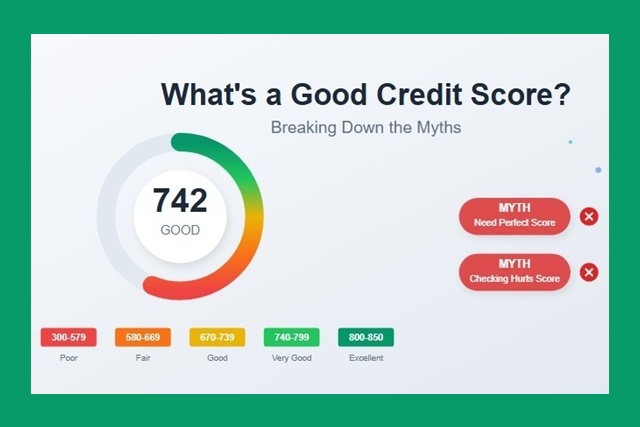What's a Good Credit Score? Breaking Down the Myths
When it comes to personal finance, few numbers carry as much weight as your credit score. Yet despite its importance, credit scores remain shrouded in mystery and misconceptions. If you've ever wondered what constitutes a "good" credit score or found yourself confused by conflicting advice, you're not alone.
Fresh Start Consulting
7/12/20254 min read
What's a Good Credit Score? Breaking Down the Myths
When it comes to personal finance, few numbers carry as much weight as your credit score. Yet despite its importance, credit scores remain shrouded in mystery and misconceptions. If you've ever wondered what constitutes a "good" credit score or found yourself confused by conflicting advice, you're not alone. Let's cut through the noise and examine what really matters when it comes to credit scores.
Understanding the Credit Score Landscape
Credit scores aren't created equal. The most commonly referenced score is the FICO score, which ranges from 300 to 850. However, VantageScore, developed by the three major credit bureaus, uses the same range but may calculate your score differently. This alone creates confusion, as you might see different scores depending on where you check.
The general credit score ranges are:
Excellent: 800-850
Very Good: 740-799
Good: 670-739
Fair: 580-669
Poor: 300-579
But here's where it gets interesting: what's considered "good" depends entirely on your goals and circumstances.
Myth #1: You Need a Perfect Credit Score
Perhaps the most pervasive myth is that you need a perfect or near-perfect credit score to access the best financial products. This simply isn't true. Most lenders offer their best rates and terms to borrowers with scores of 740 and above. Whether you have a 740 or an 850, you'll likely qualify for the same mortgage rate, credit card offers, and loan terms.
The difference between a 740 and 800+ score is often negligible in practical terms. Obsessing over reaching the highest tier can distract from more important financial goals like building an emergency fund or paying down debt.
Myth #2: Checking Your Credit Score Hurts It
This misconception keeps many people in the dark about their credit health. When you check your own credit score through legitimate sources like your bank, credit card company, or free credit monitoring services, it's considered a "soft inquiry" and has zero impact on your score.
What does hurt your score is a "hard inquiry," which occurs when a lender checks your credit as part of a loan or credit application. Even then, the impact is minimal – typically just a few points – and temporary.
Myth #3: A Good Income Guarantees a Good Credit Score
Your salary doesn't directly factor into your credit score calculation. While a higher income might make it easier to pay bills on time, credit scores are based on your credit history, not your earning potential. Someone making $40,000 annually can have an excellent credit score, while someone earning $200,000 might struggle with poor credit due to missed payments or high debt levels.
Myth #4: Carrying a Small Balance Helps Your Score
The belief that you need to carry a small balance on your credit cards to build credit is not only false but costly. Your credit utilization ratio – the amount of credit you're using compared to your available credit – is a significant factor in your score. The lower your utilization, the better.
Ideally, you should pay off your credit card balances in full each month. If you must carry a balance, keep it below 30% of your credit limit, and preferably below 10% for optimal scoring.
Myth #5: Closing Old Credit Cards Improves Your Score
Many people believe that closing unused credit cards will help their credit score by reducing available credit. This strategy often backfires. When you close a credit card, you reduce your total available credit, which can increase your utilization ratio if you carry balances on other cards.
Additionally, the length of your credit history accounts for 15% of your FICO score. Closing your oldest accounts can shorten your average account age, potentially lowering your score.
What Actually Determines a Good Credit Score
Understanding the factors that influence your credit score is crucial for improvement:
Payment History (35%): This is the most significant factor. Even one missed payment can negatively impact your score for years. Set up automatic payments or reminders to ensure you never miss a due date.
Credit Utilization (30%): Keep your credit card balances low relative to your limits. This applies both to individual cards and your overall utilization across all cards.
Length of Credit History (15%): The longer you've had credit accounts, the better. This is why keeping old accounts open (as long as they don't have annual fees) is generally beneficial.
Credit Mix (10%): Having different types of credit – credit cards, installment loans, mortgages – can positively impact your score, though you shouldn't take on debt solely for this purpose.
New Credit (10%): Opening multiple new accounts in a short period can lower your score. Space out new credit applications and only apply when necessary.
The Real-World Impact of Different Credit Scores
Context matters when determining what's "good enough" for your situation:
For Mortgage Applications: Most lenders prefer scores of 620 or higher for conventional loans, though the best rates typically require 740+. FHA loans may accept scores as low as 580 with a larger down payment.
For Credit Cards: Scores above 670 generally qualify for good rewards cards, while 740+ opens doors to premium cards with the best benefits.
For Auto Loans: Scores above 660 typically qualify for favorable rates, though you can get approved with lower scores at higher interest rates.
For Apartment Rentals: Many landlords prefer tenants with scores above 650, though requirements vary by location and property type.
Building and Maintaining Good Credit
If your credit score needs improvement, focus on the fundamentals:
Start by obtaining free credit reports from all three bureaus annually at AnnualCreditReport.com. Review them for errors and dispute any inaccuracies you find.
Pay all bills on time, every time. If you're struggling with payments, contact your creditors to discuss payment plans before missing payments.
Keep credit utilization low. If possible, pay down balances before your statement closing date to report lower utilization to the credit bureaus.
Be patient. Credit improvement takes time. While some changes can boost your score within a month or two, significant improvements often require six months to a year of consistent positive behavior.
The Bottom Line
A "good" credit score isn't a one-size-fits-all number. For most people, reaching the 670-740 range opens doors to favorable terms on most financial products. While higher scores are nice to have, they shouldn't become an obsession that distracts from other financial priorities.
Focus on the behaviors that naturally lead to good credit: pay bills on time, keep debt levels manageable, and maintain older accounts. Your credit score will improve as a natural result of these healthy financial habits.
Remember, your credit score is a tool, not a destination. Use it to access better financial opportunities, but don't let the pursuit of a perfect score overshadow your broader financial goals. Sometimes good enough really is good enough – and that's perfectly fine.
If you’d like help to improve your credit scores faster contact FreshStartConsult.com and get a FREE consultation.
CONTACT INFO
Address
Bringing People Hope
Email to find out how it works!
info@freshstartconsult.com
FRESH Start Consulting
100 Matawan Road
Matawan, NJ 07747
Suite 325 #1129


